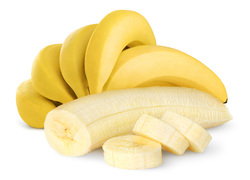
I used to love going to my grandmother’s house. She was a sweetheart and she often had bananas. I loved bananas! Sometimes she would hide her bananas because she didn’t have enough to share. To her surprise, I could smell them and would always ask for one anyway.
Fast forward: I was a mom and, recalling my love for bananas, I started buying them again. I didn't go to Whole Foods - I just went to the normal grocery store as usual. And they tasted kind of flat and bland and I couldn’t smell them anymore. What happened to the smooth, creamy bananas from my childhood? I shrugged it off as a taste enhanced by happy childhood memories and settled for the new banana taste.
One afternoon, my daughter and I headed to the store for groceries. We wanted some bananas but they were out. There were only a few yucky, green ones and one or two nasty brown ones left. As I turned to walk away, I noticed some organic bananas over in the Organic section. I suggested we pick up some organic bananas and my daughter went, well....bananas. I had taught her to eschew anything organic because I believed that food was food and deemed people crazy when they wanted to go out of their way to pay more for organic foods. Such a good daughter. Against her vehement protestations, I bought my first bunch of organic bananas and we headed home. I explained to her that they hadn’t been gassed to force ripening like the bananas we normally purchased but they should still taste okay.
One taste of an organic banana brought memories of my grandmother’s bananas flooding back to me. And I suddenly understood what gassing a banana does to the flavor, texture and smell. And guess who could smell bananas again? That was our first experience with organic food.
We pay a price for expecting year round access to many fruits and vegetables. Industry meets the demand by doing what is needed to preserve them and keep them blemish (and bug) free. Our food is gassed, sprayed, and waxed to increase sales. For most of the population, it mostly impacts taste (like my bananas). However, some people are sensitive to taste and others, apparently many others, are sensitive to the chemicals. And so they go out of their way to purchase foods minus all the added help.
FAST FACT: Contrary to common belief, bananas do not grow on trees. They grow from a root structure on a plant that is classified as an arborescent perenniel herb. It is the largest known herbaceous flowering plant and the banana is actually its berry! But everyone still refers to it as a banana tree.
Fast forward: I was a mom and, recalling my love for bananas, I started buying them again. I didn't go to Whole Foods - I just went to the normal grocery store as usual. And they tasted kind of flat and bland and I couldn’t smell them anymore. What happened to the smooth, creamy bananas from my childhood? I shrugged it off as a taste enhanced by happy childhood memories and settled for the new banana taste.
One afternoon, my daughter and I headed to the store for groceries. We wanted some bananas but they were out. There were only a few yucky, green ones and one or two nasty brown ones left. As I turned to walk away, I noticed some organic bananas over in the Organic section. I suggested we pick up some organic bananas and my daughter went, well....bananas. I had taught her to eschew anything organic because I believed that food was food and deemed people crazy when they wanted to go out of their way to pay more for organic foods. Such a good daughter. Against her vehement protestations, I bought my first bunch of organic bananas and we headed home. I explained to her that they hadn’t been gassed to force ripening like the bananas we normally purchased but they should still taste okay.
One taste of an organic banana brought memories of my grandmother’s bananas flooding back to me. And I suddenly understood what gassing a banana does to the flavor, texture and smell. And guess who could smell bananas again? That was our first experience with organic food.
We pay a price for expecting year round access to many fruits and vegetables. Industry meets the demand by doing what is needed to preserve them and keep them blemish (and bug) free. Our food is gassed, sprayed, and waxed to increase sales. For most of the population, it mostly impacts taste (like my bananas). However, some people are sensitive to taste and others, apparently many others, are sensitive to the chemicals. And so they go out of their way to purchase foods minus all the added help.
FAST FACT: Contrary to common belief, bananas do not grow on trees. They grow from a root structure on a plant that is classified as an arborescent perenniel herb. It is the largest known herbaceous flowering plant and the banana is actually its berry! But everyone still refers to it as a banana tree.

 RSS Feed
RSS Feed